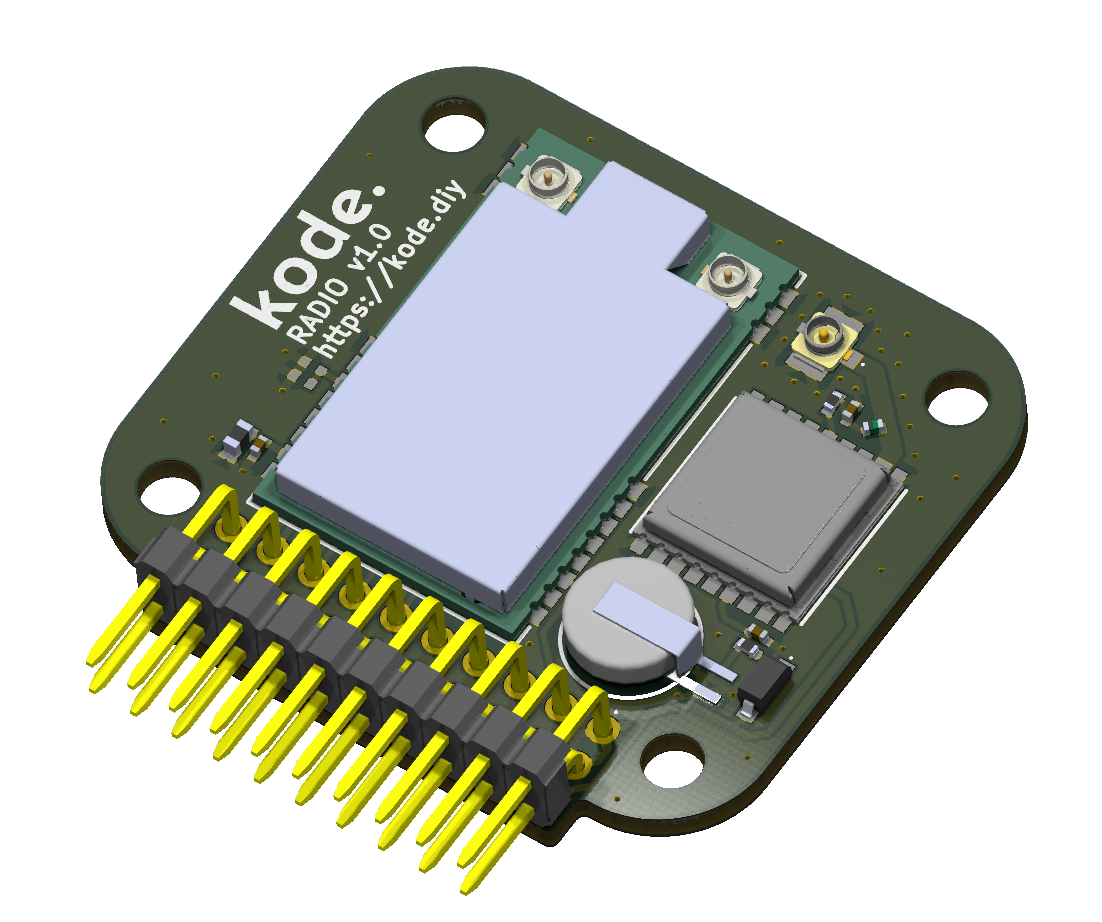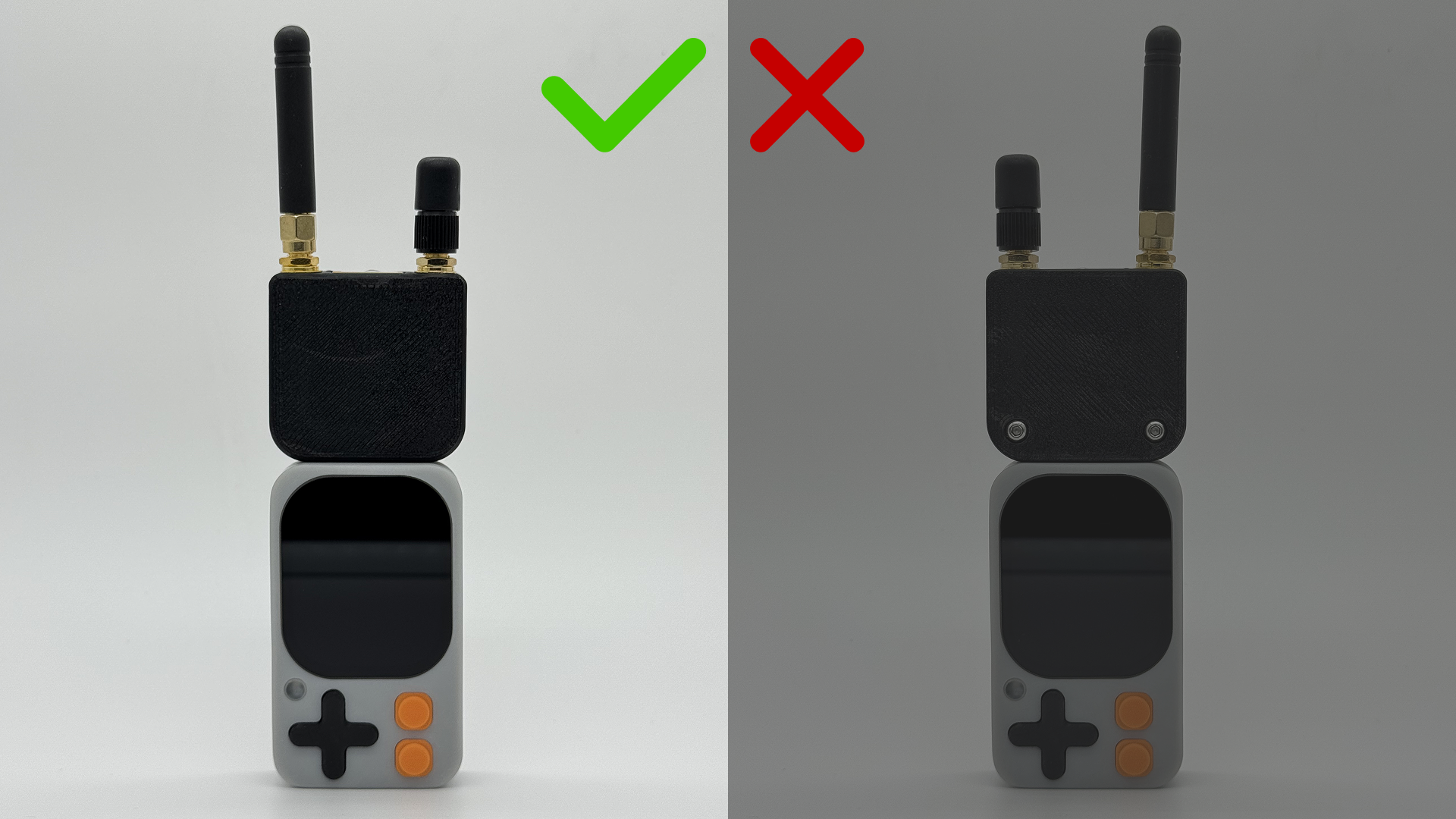Features
With this module you can communicate with LoRa and locate yourself with GNSS. It integrates a LoRa E80-900M2213S (LR1121) module from Ebyte and a GNSS MAX-M10S module from U-Blox. We are working on the integration with Meshtastic.
Connection with the Kode Dot

Connection scheme
LoRa module
The Ebyte E80-900M2213S module is connected to the ESP32-S3 as follows:| E80-900M2213S | ESP32-S3 |
|---|---|
| MISO | GPIO41 |
| MOSI | GPIO40 |
| SCK | GPIO39 |
| NSS (CS) | GPIO3 |
| BUSY | GPIO13 |
| LR_NRESET | GPIO2 |
| DIO9 | GPIO12 |
| DIO8 | GPIO1 |
| DIO7 | GPIO11 |
GNSS module
The GNSS MAX-M10S module is connected to the ESP32-S3 as follows:| MAX-M10S | ESP32-S3 |
|---|---|
| TXD | GPIO44 |
| RXD | GPIO43 |
| SCL | GPIO47 |
| SDA | GPIO48 |
Code examples
Communication with LoRa
lora_test.ino
Copy
/**
* LR1121 Channel Scanner (RX only, no TX).
* Scans 868 MHz and 2.4 GHz bands with dynamic BW and SF changes.
* Measures RSSI (channel noise) and prints results in CSV format.
*/
/* ───────── KODE | docs.kode.diy ───────── */
#include <Arduino.h>
#include <RadioLib.h>
/* Pin configuration (based on your design) */
#define NSS_PIN 3 /* Chip Select */
#define DIO1_PIN 12 /* IRQ */
#define NRST_PIN 2 /* Reset */
#define BUSY_PIN 13 /* Busy */
#define MISO_PIN 41
#define MOSI_PIN 40
#define SCK_PIN 39
/* RF Switch mapping for E80-900M2213S */
static const uint32_t rfswitch_dio_pins[] = {
RADIOLIB_LR11X0_DIO5, RADIOLIB_LR11X0_DIO6,
RADIOLIB_NC, RADIOLIB_NC, RADIOLIB_NC
};
static const Module::RfSwitchMode_t rfswitch_table[] = {
{ LR11x0::MODE_STBY, { LOW, LOW } },
{ LR11x0::MODE_RX, { LOW, LOW } }, /* RX */
{ LR11x0::MODE_TX, { LOW, HIGH } }, /* TX Sub-1GHz LP */
{ LR11x0::MODE_TX_HP, { HIGH, LOW } }, /* TX Sub-1GHz HP */
{ LR11x0::MODE_TX_HF, { HIGH, HIGH } }, /* TX 2.4GHz */
{ LR11x0::MODE_GNSS, { LOW, LOW } },
{ LR11x0::MODE_WIFI, { LOW, LOW } },
END_OF_MODE_TABLE,
};
/* Instances */
SPIClass spi(HSPI);
LR1121 radio = new Module(NSS_PIN, DIO1_PIN, NRST_PIN, BUSY_PIN, spi);
/* Frequency sweep settings */
const float FREQS_868[] = { 863.0, 866.0, 868.0, 869.5 };
const float FREQS_24[] = { 2403.5, 2425.0, 2450.0, 2479.5 };
const size_t N_868 = sizeof(FREQS_868) / sizeof(FREQS_868[0]);
const size_t N_24 = sizeof(FREQS_24) / sizeof(FREQS_24[0]);
/* Dynamic parameters */
const float BWS_KHZ[] = { 125.0, 203.125 };
const int SFS[] = { 7, 9, 12 };
const int CR = 5;
const int PWR_DBM = 10;
const uint8_t PREAMBLE = 8;
const float TCXO_V = 1.8;
/* Listening time per measurement point */
const uint16_t DWELL_MS = 200;
/* Utilities */
/* Hardware reset for LR1121 */
static void hardResetModule() {
pinMode(NRST_PIN, OUTPUT);
digitalWrite(NRST_PIN, LOW);
delay(50);
digitalWrite(NRST_PIN, HIGH);
delay(50);
}
/* Configure LR1121 with given parameters */
static bool configRadio(float freqMHz, float bwkHz, int sf) {
int st = radio.begin(freqMHz, bwkHz, sf, CR, 0x12 /*sync*/, PWR_DBM, PREAMBLE, TCXO_V);
if (st != RADIOLIB_ERR_NONE) {
Serial.print("Config FAIL f="); Serial.print(freqMHz, 3);
Serial.print(" MHz BW="); Serial.print(bwkHz, 3);
Serial.print(" kHz SF="); Serial.print(sf);
Serial.print(" code="); Serial.println(st);
return false;
}
return true;
}
/* Measure RSSI once at given parameters and print CSV line */
static void measureOnce(float freqMHz, float bwkHz, int sf, const char* bandTag) {
if (!configRadio(freqMHz, bwkHz, sf)) return;
/* Start RX */
int st = radio.startReceive();
if (st != RADIOLIB_ERR_NONE) {
Serial.print("RX start FAIL code="); Serial.println(st);
return;
}
delay(DWELL_MS);
float rssi = radio.getRSSI();
/* CSV format output: BAND,FREQ_MHz,BW_kHz,SF,RSSI_dBm */
Serial.print(bandTag); Serial.print(",");
Serial.print(freqMHz, 3); Serial.print(",");
Serial.print(bwkHz, 3); Serial.print(",");
Serial.print(sf); Serial.print(",");
Serial.println(rssi, 1);
radio.standby();
}
/* Scan a full band across frequencies, BWs and SFs */
static void scanBand(const float* freqs, size_t nFreq, const char* bandTag) {
Serial.println();
Serial.println("BAND,FREQ_MHz,BW_kHz,SF,RSSI_dBm");
for (size_t i = 0; i < nFreq; i++) {
for (size_t b = 0; b < sizeof(BWS_KHZ)/sizeof(BWS_KHZ[0]); b++) {
for (size_t s = 0; s < sizeof(SFS)/sizeof(SFS[0]); s++) {
measureOnce(freqs[i], BWS_KHZ[b], SFS[s], bandTag);
}
}
}
}
/* Setup */
void setup() {
Serial.begin(115200);
while (!Serial) { delay(10); }
Serial.println("\n=== LR1121 Channel Scanner (RSSI only) ===");
Serial.println("RSSI = channel noise (closer to 0 => more noise)");
pinMode(BUSY_PIN, INPUT);
Serial.println("Resetting module...");
hardResetModule();
Serial.println("Initializing SPI...");
spi.begin(SCK_PIN, MISO_PIN, MOSI_PIN, NSS_PIN);
radio.setRfSwitchTable(rfswitch_dio_pins, rfswitch_table);
Serial.println("\n--- Scanning: 868 MHz ---");
scanBand(FREQS_868, N_868, "868MHz");
Serial.println("\n--- Scanning: 2.4 GHz ---");
scanBand(FREQS_24, N_24, "2400MHz");
Serial.println("\nScan complete. Restart to repeat.");
}
/* Loop */
void loop() {
delay(1000);
}
Location with GNSS
For using the GNSS module, we recommend using the library SparkFun u-blox GNSSUse by I2C
This code is an example of how to use the GNSS module via I2C.gnss_test_I2C.ino
Copy
/**
* Example: Reading GNSS (GPS) data from a Kode Radio Module via I2C.
* Retrieves latitude, longitude, and altitude from the u-blox module.
* Uses the PVT (Position, Velocity, Time) message for data retrieval.
*/
/* ───────── KODE | docs.kode.diy ───────── */
#include <SparkFun_u-blox_GNSS_v3.h>
#include <Wire.h>
/* GNSS module object */
SFE_UBLOX_GNSS myGNSS;
void setup()
{
Serial.begin(115200);
delay(1000);
Serial.println("Kode Radio Module Example");
/* ─── Initialize I2C with SDA = GPIO48, SCL = GPIO47 ─── */
Wire.begin(48, 47);
/* Enable GNSS debug messages on Serial (optional) */
myGNSS.enableDebugging(); // Comment this line to disable debug messages
/* Try to connect to the u-blox GNSS module until successful */
while (myGNSS.begin() == false)
{
Serial.println(F("u-blox GNSS not detected. Retrying..."));
delay(1000);
}
/* Set I2C output to UBX protocol only (disable NMEA messages) */
myGNSS.setI2COutput(COM_TYPE_UBX);
}
void loop()
{
/* If PVT data is available, read and display it */
if (myGNSS.getPVT() == true)
{
/* Get and print latitude */
int32_t latitude = myGNSS.getLatitude();
Serial.print(F("Lat: "));
Serial.print(latitude);
/* Get and print longitude */
int32_t longitude = myGNSS.getLongitude();
Serial.print(F(" Long: "));
Serial.print(longitude);
Serial.print(F(" (degrees * 10^-7)"));
/* Get and print altitude (MSL) */
int32_t altitude = myGNSS.getAltitudeMSL();
Serial.print(F(" Alt: "));
Serial.print(altitude);
Serial.print(F(" (mm)"));
Serial.println();
}
}
Use by UART
This code is an example of how to use the GNSS module via UART.gnss_test_UART.ino
Copy
#include <SparkFun_u-blox_GNSS_v3.h>
/* GNSS object for serial communication */
SFE_UBLOX_GNSS_SERIAL myGNSS;
/* ─── GNSS UART pin mapping ───
* GNSS_RX_PIN → MCU pin that receives data from GNSS TX
* GNSS_TX_PIN → MCU pin that sends data to GNSS RX
*/
static const int GNSS_RX_PIN = 44; // MCU receives on GPIO44
static const int GNSS_TX_PIN = 43; // MCU transmits on GPIO43
/* Hardware serial instance (UART1) */
HardwareSerial GNSSSerial(1);
void setup()
{
Serial.begin(115200);
delay(1000);
Serial.println("u-blox GNSS via UART1 (GPIO44/43)");
/* ─── Initialize UART1 on the specified pins ───
* Baud rate: 38400
* Format: 8 data bits, no parity, 1 stop bit (SERIAL_8N1)
*/
GNSSSerial.begin(38400, SERIAL_8N1, GNSS_RX_PIN, GNSS_TX_PIN);
/* Enable GNSS debug messages on main Serial (optional) */
myGNSS.enableDebugging(Serial);
/* Configure UART1 output → UBX protocol only (disable NMEA messages) */
myGNSS.setUART1Output(COM_TYPE_UBX);
/* Attempt to connect to the GNSS module until successful */
while (!myGNSS.begin(GNSSSerial)) {
Serial.println(F("u-blox GNSS not detected. Retrying..."));
delay(1000);
}
}
void loop()
{
/* If PVT (Position, Velocity, Time) data is available, read and display it */
if (myGNSS.getPVT()) {
int32_t lat = myGNSS.getLatitude(); // Latitude in degrees * 10^-7
int32_t lon = myGNSS.getLongitude(); // Longitude in degrees * 10^-7
int32_t alt = myGNSS.getAltitudeMSL(); // Altitude MSL in millimeters
Serial.print(F("Lat: ")); Serial.print(lat);
Serial.print(F(" Long: ")); Serial.print(lon);
Serial.print(F(" (deg*1e-7) Alt: ")); Serial.print(alt);
Serial.println(F(" (mm)"));
}
}

